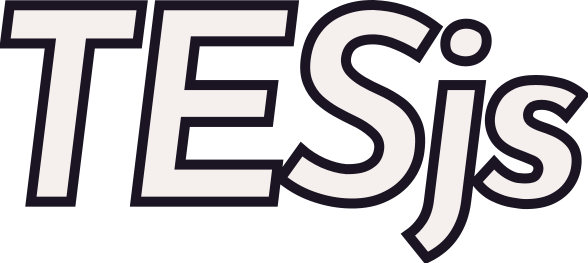A module to streamline the use of Twitch EventSub in Node.js and Web applications
WebSockets now Available!
WebSocket transport is now available in TESjs! You can use TESjs with WebSocket transport in your client and server-side applications. You can try this out in TESjs v1.0.0 and higher.
Documentation
Learn how to use TESjs by reading through the documentation. Supplement your development with the Twitch EventSub documentation as well.
Install
TESjs is available for install through npm
npm install tesjsOr in browsers through a CDN
<script src="https://cdn.jsdelivr.net/gh/mitchwadair/tesjs@v1.0.2/dist/tes.min.js"></script>Basic Usage
Keep in mind that in order for your subscriptions to work when using webhook transport, the url you are pointing to for the listener MUST use HTTPS and port 443. More information can be found in the Twitch documentation here. Their suggestion for testing locally is to use a product like ngrok to create an HTTPS endpoint to forward your local server (which is hosted on HTTP).
const TES = require("tesjs");
// initialize TESjs
const tes = new TES({
identity: {
id: YOUR_CLIENT_ID,
secret: YOUR_CLIENT_SECRET //do not ship this in plaintext!! use environment variables so this does not get exposed
},
listener: {
type: "webhook",
baseURL: "https://example.com",
secret: WEBHOOKS_SECRET,
}
});
// define an event handler for the `channel.update` event
// NOTES:
// this handles ALL events of that type
// events will not be fired until there is a subscription made for them
tes.on("channel.update", (event) => {
console.log(`${event.broadcaster_user_name}'s new title is ${event.title}`);
});
// create a new subscription for the `channel.update` event for broadcaster "1337"
tes.subscribe("channel.update", { broadcaster_user_id: "1337" })
.then(() => {
console.log("Subscription successful");
}).catch(err => {
console.log(err);
});Browser
TESjs supports WebSocket transport, and can be used in a browser environment
<script src="https://cdn.jsdelivr.net/gh/mitchwadair/tesjs@v1.0.2/dist/tes.min.js"></script>
<script>
const config = {
identity: {
id: YOUR_CLIENT_ID,
accessToken: YOUR_USER_ACCESS_TOKEN,
},
listener: { type: "websocket" },
};
const tes = new TES(config);
// define an event handler for the `channel.update` event
// NOTES:
// this handles ALL events of that type
// events will not be fired until there is a subscription made for them
tes.on("channel.update", (event) => {
console.log(`${event.broadcaster_user_name}'s new title is ${event.title}`);
});
// create a new subscription for the `channel.update` event for broadcaster "1337"
tes.subscribe("channel.update", { broadcaster_user_id: "1337" })
.then(() => {
console.log("Subscription successful");
}).catch(err => {
console.log(err);
});
</script>Use an Existing Express Server
TESjs uses Express under the hood to host a webhooks endpoint. If you already have a server running on Express that you want to use, you can pass it into the configuration object for TESjs.
const TES = require("tesjs");
const express = require("express");
// create our Express server
const app = express();
app.get("/", (req, res) => {
res.send("OK");
});
app.listen(8080);
// initialize TESjs
const tes = new TES({
identity: {
id: YOUR_CLIENT_ID,
secret: YOUR_CLIENT_SECRET //do not ship this in plaintext!! use environment variables so this does not get exposed
},
listener: {
type: "webhook",
baseURL: "https://example.com",
secret: WEBHOOKS_SECRET,
server: app
}
});
// define an event handler for the `channel.update` event
// NOTES:
// this handles ALL events of that type
// events will not be fired until there is a subscription made for them
tes.on("channel.update", (event) => {
console.log(`${event.broadcaster_user_name}'s new title is ${event.title}`);
});
// create a new subscription for the `channel.update` event for broadcaster "1337"
tes.subscribe("channel.update", { broadcaster_user_id: "1337" })
.then(() => {
console.log("Subscription successful");
}).catch(err => {
console.log(err);
});Problems/Suggestions/Questions?
If you have any questions, suggestions, need to report a bug, etc, submit an issue.
Contribute
Want to contribute to TESjs? Check out the contribution guidelines to see how.
Support
Want to help support me in maintaining TESjs? Consider sponsoring me on GitHub Sponsors. You can also give a one-time donation through PayPal.
Community
Have you made something with TESjs? I'd love to hear about it! You can tweet me @imMtB_ and show off your project.




